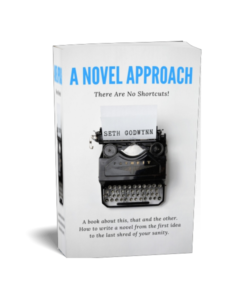How to Create a Book Title
A.P. Atkinson
A lot of people wonder how to come up with a title for their novel. It’s not like the names of a character, where you can just go online and look for names and check out the meanings behind them. Titles are largely unique and there’s no database of good suggestions. That would rather defeat the purpose if there was.
So, how do you come up with a good title?

Well the first thing you have to do is understand what a title is, and what it’s used for. It might appear on the surface to simply be the name of your book, but it has to be so much more than that. The first job your titles needs to do it to get your book noticed, and that’s not as easy as it sounds. Your title has to give an impression of what the story will be about, but also leap off the page in an exciting and provocative way. It should inspire questions and leave itself embedded in the memory of everyone who sees it.
Excellent examples of this are, Great Expectations, The Taming of the Shrew, The Mothman Prophesies and The Hitchhikers Guide to the Galaxy.
They hint at the content while also posing questions in the mind of the audience. Great expectations of what, and for whom? The taming of what shrew? How do you tame a shrew? What’s a Mothman and why should I care about his visions of the future? Before you know it, the book is in your hand and those questions are screaming in your brain for answers, all of which are probably ‘42’.
So the title should be short, not really more than four words. It should suggest the content of the work, it should be exciting, interesting and fun and it should inspire questions about what’s inside.
But, increasingly these days, it has another, even more important job.
It’s not against the law to have the same title as another book, but it’s not advisable. Your book is going to be lost in a sea of information, no matter what happens. Your title has to be different enough to help it swim to the surface. The world wide web is awash with names, titles, phrases and searches. There’s a myriad of information out there and your title has to find a way to get itself found by your audience, even when they’re not looking for it.
Your name and title should mean you can find it instantly in a search engine, without finding anything else by accident. That wouldn’t happen if you choose a generic title, or a title with only a single word.

Imagine if your name was Chuck Banana, and you called your book ‘Skin.’ What chance would you have of being found with that kind of search? Not very good, I can assure you. So while you’re considering your title, it’s very important to consider that you need to be found. The more unique and interesting your title is, the more it will stand out.
But what makes a bad title?
A lot of amateur writers make the mistake of making their titles too complicated, or losing themselves in cliches.
As a rule of thumb, your title shouldn’t include the words ‘death’ or ‘evil’ because people will laugh at you. Avoid things that have been done so many times that they’ve become hackneyed. If you’re writing a science fiction, don’t include ‘Star’ in the title. If you’re writing a romance, avoid the word ‘love’.
A good way to approach this is to work out all of the genres your book touches on and then work out all of the cliched, over-used words that you see too often. Then write them down, set fire to the list and watch it shrivel away in a curling wisp of sooty smoke.

You can use the name of your titular character, but make sure that name is interesting enough to sell the work. Boring names, like Harry Potter are probably a bad idea. Names like Artemis Foul are a much better choice, because it’s simply more memorable. However, you do face reader confusion, they might not realise which is the title and which is the name of the author. Worse, a lot of people are bad with names. They never forget faces, but names slip out of their memory like grains of sand passing through a colander.
That’s why a memorable title, linked to a vibrant and fascinating cover will help sell your book. They’ll stick in the mind until the audience buckles under and gives your work a go – Maybe.
So how do you come up with a title? Well, considering that an author is meant to be a creative genius, it shouldn’t be that hard.
First of all, take your story and look it over. Imagine you’re pitching it to a friend, in order to get them to read it. What’s it about? How can you reduce the meaning of the book down to just one sentence? Then, what’s the key theme of the book? What does it talk about? What concept drives the narrative?
And, finally, what is the key event or thing? What object drives the story? Is it set on a space-ship, it is about a city, is it about the end of the world?
Once you’ve got those three answers, the title should begin to make itself obvious. Look at the sentence that pitches the story, look at the theme and look at the one key thing the story is about. Now, put those together and see if you can get the title from there.
If not, maybe your brain is trying to tell you something about your story?
For most of us, this simple trick will be all we need. We just take the key elements of a story and put them together on a page and see how the words, themes and ideas come together.
Choosing a title isn’t easy, but it’s often not as hard as it seems.
Many thanks for reading this article. We hope it was interesting, informative and entertaining. Follow us on social media or share our content on your own pages. It helps us grow so we can create more free content to help you.

